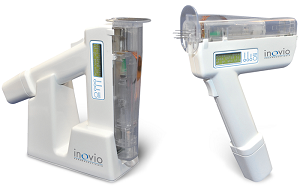 |
| Inovio's SP-5P intramuscular electroporation handpiece--Courtesy of Inovio |
Biotech Inovio ($INO) revealed May 27 that all the mice that received its monoclonal antibody targeting chikungunya virus were protected from the disease, raising hopes that the first drug for the condition could be on the horizon.
But the product is only in the preclinical phase, so relief will take some time to arrive. COO Niranjan Sardesai told FierceDrugDelivery that the company is now looking at further preclinical development.
The candidate uses Inovio's patented delivery approach, which utilizes DNA plasmids as the vector. The patient then produces the monoclonal antibody in vivo--in this case against the chikungunya virus.
Inovio says that its Cellectra electroporation system was used to deliver the plasmids in the experiment. The device injects the plasmids intramuscularly in the patient. Then, the plasmids enter cells via pores in their membranes created by short bursts of electrical pulses from the device, causing the cells to produce monoclonal antibodies, according to the statement.
Unlike previous Inovio candidates, the antibodies are produced in the plasmid "infected" cells themselves, not the lymph nodes, Sardesai said. "The heavy chain and the light chain are expressed inside the cell and then they combine to form the antibody directly," he said, adding "the beauty of this is that any cell can make the antibody."
By facilitating the in vivo production of monoclonal antibodies, as opposed to production outside body, the technique eliminates the need for costly lab development and production, Sardesai said, for it relies on natural biological functions for antibody production.
"Inovio continues to demonstrate that it is one of the most innovative and scientifically productive biotechnology companies in our industry," said CEO J. Joseph Kim in a statement. "We have again shown that we can design a novel mAb construct capable of providing therapeutic benefit and are confident we can create DNA-based monoclonal antibodies against any infectious disease or cancer. These advancements represent a new area of value enhancement for Inovio stakeholders and we plan to develop multiple important monoclonal product candidates, alone or with new partners."
Chikungunya is a disease common to the developing world, largely affecting areas of Asia and Africa, but the mosquito-borne disease has recently spread to the Caribbean. More than 55,000 people there have been infected, and three cases have been confirmed in Florida by state health officials. The World Health Organization says there is no antiviral treatment available for the disease.
Inovio's stock recently fell 9% after the board announced a 1-4 reverse split--usually a bad sign. The Motley Fool points out that the split occurs just weeks before key data are supposed to be released for its Phase II VGX-3100 cervical dysplasia vaccine, and that a higher price would allow more institutional investors to buy the stock and allow the company to raise additional funds if the VGX-3100 data is negative without having to face delisting.
Sardesai said the measure passed with the overwhelming support of stockholders and that the date of the reverse split has not been decided. The company intends to announce the top line results of the trial in midsummer, he said.
Inovio also announced May 27 that it has sold its 90%-owned animal health subsidiary to South Korea's Plumbline Life Sciences for an undisclosed sum.
In its May 12 Q1 2014 earnings statement, Inovio said it earned revenues of $2.4 million, including $1.4 million of development fees from Roche ($RHHBY). It lost $10.8 million in the quarter. The company's cash position was $116.8 million, enough to meet its capital requirements through the end of 2017, according to the statement.
The stock trades slightly above $2 on the NYSE MKT small cap exchange.
Its pipeline includes candidates for cervical, head and neck, and breast, lung and pancreatic cancer.
- read the release